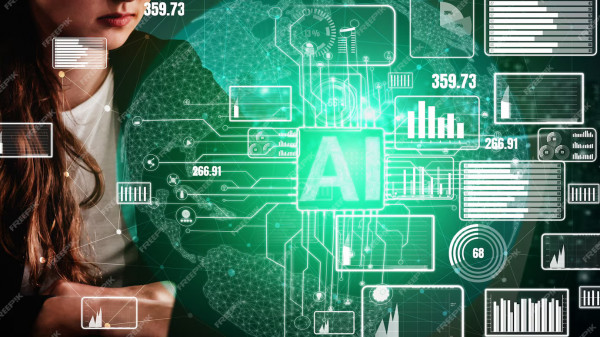There are many disruptions in the world; some goods and services are in high demand while others are obsolete. Every business needs a strong, smart supply chain to stay competitive and get an edge over other businesses. An AI-assisted thinking system called an “intelligent supply chain” can automatically look at upstream manufacturing, logistics, product intake, transportation, and delivery to figure out how to make the right product at the right time and place.
To achieve this commitment, it requires a data blanket that spans not only fragmented systems but the entire manufacturing and service landscape and even the end-to-end supply chain. As a result, we must fully leverage digital AI and ML technology to either create a new intelligent supply chain or modify existing supply chains. Let’s talk about how AI and machine learning influence supply chain trends and the key areas where AI can have a positive impact.
What does an intelligent supply chain look like?
Businesses are using the latest retail digital transformations, such as artificial intelligence (AI), machine learning (ML), unified commerce predictive analytics, and big data, to adapt to the intelligent supply chain and gain a competitive edge in the global market.
AI is the brains behind business intelligence in the supply chain. This includes machine learning and predictive analytics. These technological solutions use big data, business trends, and logistical patterns to improve the entire digital supply chain. Intelligent supply chains make accuracy and transparency much better, but many supply chain processes are still done by hand and aren’t very good.
So, what does all this mean?
To begin, an intelligent supply chain is a system that is no longer a separate entity composed of manufacturers and retailers. In the modern world, all parts of the supply chain must be linked and optimized with the help of the right connecting networks and huge amounts of data in order to improve decision-making, forecasting, cost control, and overall efficiency.
Emerging intelligent supply chain trends
According to studies by Gartner, inventory management has significantly improved for 37% of organizations that have incorporated AI in some capacity in their supply chain, supplier empanelment, workforce productivity, efficiency, and overall customer experience.
Below are some of the emerging intelligent supply chain trends to watch out for:
- Sustainability of operations: The viability of operations has clearly been hampered by the COVID-19 epidemic. Because of unforeseen supply chain interruptions at various levels, most businesses are forced to redesign and plan their global supply chain operations as well as strengthen certain competencies for long-term sustainability. A survey by the Capgemini Research Institute found that 77% of companies recognize the value of planned change, with AI-driven sustainability expected in key industries such as manufacturing, forecasting, capacity utilisation, and logistics in the next few years.
- Improved supply chain collaboration: Covid-19 has made us realize that nothing can effectively work as an independent entity. Moreover, supply chain processes will only undermine and adversely affect value chains if data exchange and movement are not connected. Unexpected bottlenecks and restrictions that lower supply chain efficiency can be eliminated with the aid of a thorough supply chain collaboration based on intelligent and complete end-to-end visibility. Businesses can combine their upstream and downstream activities for a smooth supply chain movement with the use of AI and ML-driven platforms, saving time and resources on bottlenecks and restriction reduction.
- Speed-centered innovation: Although supply chains with the most advanced digital infrastructure can make advances and yet fall short of complete future predictions. The balance between supply and demand is also continually changing. Companies are working hard to meet changing customer needs while reducing costs without sacrificing quality. The only way to change is through constant innovation, at speed and scale. With the help of AI and ML-driven innovation, companies are making the most of their IoT technology to accelerate this evolution and do their best to keep up with the changing times.
- Intelligent technology workflows: Intelligent workflows powered by IoT and AI/ML increase the effectiveness of supply chain processes. It is accomplished by enhancing the network’s proactivity, agility, and transparency in accordance with user needs. Intelligent supply chains will assist us in processing real-time data more effectively, managing unforeseen obstacles, and delivering in accordance with the established business goals by applying technology-enabled business process approaches, including AI/ML and advanced analytics.
5 most important use cases of AI and ML in supply chain
- Predictive analytics
Effective predictive projections help the supply chain in many ways, like keeping the right amount of inventory on hand and lowering the costs of keeping that inventory in good shape. With the help of ML models, companies can get full benefits from using predictive analytics for demand forecasting. Such models are able to find hidden trends in both historical and present data. - Quality inspections that are automated for effective management
ML-enabled techniques that use picture recognition can automatically find flaws in industrial equipment and parts. The benefit of these automated quality inspections powered by ML and AI is that they lower the possibility of giving clients substandard goods. - Real-Time visibility to boost customer experience
Using ML techniques along with deep analytics, IoT, and real-time monitoring will make it much easier to see what’s going on in the supply chain. This will help companies give their customers a better experience and meet deadlines faster. - Streamlining production planning
ML and AI can be used to make production planning a lot less complicated. ML models and approaches can be used to test advanced algorithms on production data that is already accessible, assisting in the identification of inefficient regions that can be optimized with careful planning. - Reduces cost and response times
Various B2C businesses are using machine learning (ML) techniques to start automated replies and handle demand-supply mismatches, which lowers costs and enhances the customer experience.
Conclusion
Many companies use AI, ML, IoT, predictive analytics, and other digital technologies to improve their supply chains. Over time, a traditional supply chain can be turned into an AI-driven intelligent supply chain, which leads to higher productivity, better customer service, and lower costs. Consider following the route of the intelligent supply chain now if your company’s vision is to expand and remain relevant.
FAQs
- What are the four 4 stages of supply chains?
- What are the 7 supply chain functions?
- Will AI take over the supply chain?
- How can companies adopt intelligent supply chain practices?
- What are some of the benefits of AI in the supply chain?



